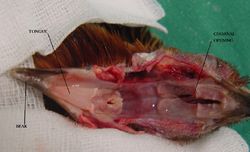Difference between revisions of "Avian Tongue - Anatomy & Physiology"
| (22 intermediate revisions by 6 users not shown) | |||
| Line 1: | Line 1: | ||
| − | + | {{OpenPagesTop}} | |
| − | + | ==Overview== | |
| − | == | ||
The size and structure of the avian tongue varies between species. It is related to functional requirements. | The size and structure of the avian tongue varies between species. It is related to functional requirements. | ||
| + | [[Image:Avian Tongue and Oral Cavity.jpg|thumb|right|250px|Avian Tongue - Copyright RVC 2008]] | ||
==Structure and Function== | ==Structure and Function== | ||
| − | + | The avian tongue is narrow, pointed and contains little intrinsic muscle. The '''enteroglossal bone''' is present consisting of bone and cartilage with medullary spaces containing red marrow. It is supported by the lingual process of the '''[[Hyoid Apparatus - Anatomy & Physiology|hyoid bone]]''' and rudimentary lingual muscles. It contains striated muscle fibres. | |
| − | |||
| − | |||
| − | |||
| − | |||
| − | |||
| − | |||
| − | |||
| − | |||
| − | |||
| − | |||
| − | |||
| − | |||
| − | |||
==Histology== | ==Histology== | ||
| − | + | A few caudally directed '''horny papillae''' are present on the avian tongue. There is a thick '''stratified squamous epithelium'''. The tongue is keratinised and has mucoid glands, although has no [[Tongue - Anatomy & Physiology#Taste Buds|taste buds]]. Lymphatic tissue is spread throughout the '''corium'''. | |
| − | + | ==Species Differences== | |
| − | + | '''Parrots''' use their muscular tongue to lap water and to produce human sounds (see [[Syrinx - Anatomy & Physiology#Species Differences|syrinx species differences]]). | |
| − | + | ==Links== | |
| − | |||
| − | |||
| − | |||
| − | |||
| − | |||
| − | |||
| − | == | ||
| − | + | '''Click here for [[Tongue - Anatomy & Physiology|tongue - Anatomy & Physiology]]'''. | |
| − | = | + | {{Template:Learning |
| + | |flashcards = [[The Avian Alimentary Tract - Anatomy & Physiology - Flashcards|Avian Alimentary Tract]] | ||
| + | }} | ||
| − | [[ | + | {{OpenPages}} |
| + | [[Category:Avian Alimentary System - Anatomy & Physiology]] | ||
| + | [[Category:A&P Done]] | ||
Latest revision as of 14:26, 28 June 2012
Overview
The size and structure of the avian tongue varies between species. It is related to functional requirements.
Structure and Function
The avian tongue is narrow, pointed and contains little intrinsic muscle. The enteroglossal bone is present consisting of bone and cartilage with medullary spaces containing red marrow. It is supported by the lingual process of the hyoid bone and rudimentary lingual muscles. It contains striated muscle fibres.
Histology
A few caudally directed horny papillae are present on the avian tongue. There is a thick stratified squamous epithelium. The tongue is keratinised and has mucoid glands, although has no taste buds. Lymphatic tissue is spread throughout the corium.
Species Differences
Parrots use their muscular tongue to lap water and to produce human sounds (see syrinx species differences).
Links
Click here for tongue - Anatomy & Physiology.
| Avian Tongue - Anatomy & Physiology Learning Resources | |
|---|---|
 Test your knowledge using flashcard type questions |
Avian Alimentary Tract |
Error in widget FBRecommend: unable to write file /var/www/wikivet.net/extensions/Widgets/compiled_templates/wrt673501f20ccc25_19000434 Error in widget google+: unable to write file /var/www/wikivet.net/extensions/Widgets/compiled_templates/wrt673501f210e333_91099396 Error in widget TwitterTweet: unable to write file /var/www/wikivet.net/extensions/Widgets/compiled_templates/wrt673501f214be79_32781030
|
| WikiVet® Introduction - Help WikiVet - Report a Problem |
